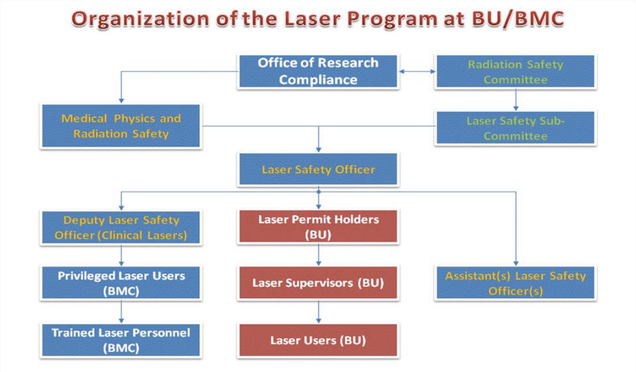Section 4: Laser Safety Program Structure
Laser Safety Program Structure
Radiation Safety Committee, Laser Safety Subcommittee, Laser Safety Officer, Division Medical Physics and Radiation Safety, Permit Holders, Supervisors and Laser Users have an important role in developing, improving and monitoring safe use of Lasers at BU/BMC.
Figure: Organization of the Laser Program at BU/BMC

Radiation Safety Committee (RSC)
The Radiation Safety Committee (RSC) oversees use of all radiation generating devices (including Lasers) and radioisotopes at Boston University and Boston Medical Center. The Radiation Safety Committee oversees the work of the Laser Safety Subcommittee.
Laser Safety Subcommittee (LSS)
The BU/BMC Laser Safety Subcommittee (LSS) is responsible for continuing review of the laser safety program at the Boston University and Boston Medical Center. The Laser Safety Subcommittee ensures that all laser related work and research is conducted in compliance with federal, state, local, and internal laser safety regulations and standards. The Laser Safety Subcommittee meets quarterly to review the status of the Laser Safety Program.
The responsibilities of the LSS are listed below:
- Developing and approving new Laser Safety Policies and guidance;
- Reviewing new applications for Laser Permits and proposed method of use;
- Reviewing renewal of permits applications;
- Reviewing results of inspections, findings, and corrective actions;
- Following up on incidents and abnormal events;
- Suspending or revoking privileges of any user of lasers on Boston University or the Boston Medical Center; and
- Recommending the expenditure of funds for the laser safety program.
Laser Safety Officer (LSO)
The Laser Safety Office (LSO) operates out of the Environmental Health & Safety’s Division of Medical Physics and Radiation Safety
The responsibilities of the LSO are listed below:
- Classifying or verifying classifications of lasers and laser systems;
- Evaluating laser hazards;
- Establishing Nominal Hazard Zones (NHZ) where class 3b And 4 Lasers are used;
- Determining adequacy of control measures;
- Recommending substitute or alternate controls;
- Approving SOPs, alignment procedures, and alternative administrative controls as required;
- Recommending or approving protective equipment (i.e., eyewear, clothing, barriers, screens, etc.);
- Ensuring that protective equipment is audited periodically;
- Approving the wording of area signs and equipment labels;
- Approving new and/or modified lasers and laser facilities prior to use;
- Auditing laser systems and facilities periodically; and
- Developing and overseeing administration of adequate laser safety training.
Division of Medical Physics and Radiation Safety (DMPRS)
DMPRS provides services to assist the laser users in maintaining a comprehensive laser safety program.
The responsibilities of the DMPRS are listed below:
- Registration of class 3b and 4 lasers with appropriate regulatory agencies;
- Oversight of purchasing new lasers systems;
- Supervision of transfers and disposal of laser systems;
- Providing laser safety training;
- Assisting in laser incident investigation;
- Monitoring the implementation of the Laser Safety Program;
- Providing support necessary to assist Laser Safety Program; and
- Reviewing and maintaining relevant program documentation.
Research Laser Permit Holder
The Laser Permit Holder is responsible for:
- All safety and compliance issues as specified on the application for a Permit to Use Class 3b and Class 4 Laser Systems;
- Providing the necessary equipment and work environment for the safe use of lasers;
- Ensuring that all laser users receive an initial laser safety training and bi-annual refresher training;
- Developing Standard Operating Procedures (SOP) which include safety aspects for all Class 3b and 4 lasers;
- Providing all lasers users with laser specific trainings (SOPs)
- Reviewing all SOPs annually;
- Training and authorizing laser users to independently perform laser system alignments;
- Informing all individuals working in proximity to laser systems of the existing hazards;
- Updating Laser Permits with accurate information (i.e. new laser users, inventory changes, and locations of use.);
- Renewing permits biennially; and
- Assisting in laser safety inspection and post incident investigations.
Research Laser Supervisor
A Permit Holder may designate a laser supervisor who can perform all administrative tasks associated with laser operations and permit maintenance. However, all liability for safety and compliance issues remains under the exclusive responsibility of the Permit Holder.
Research Laser Users
- Complying with all requirements of the Boston University/Boston Medical Center Laser Safety Program;
- Conducting all laser activities in accordance with the standard operating procedures and accepted laboratory safety practices;
- Completion of the online Laser Safety training via SciShield;
- Completion and submission of the “Laser Safety User Certification” form;
- Utilizing appropriate laser eye protection; and
- Reporting any unsafe practices or usage of lasers to the Permit Holder and/or Office of Medical Physics and Radiation Safety.